|
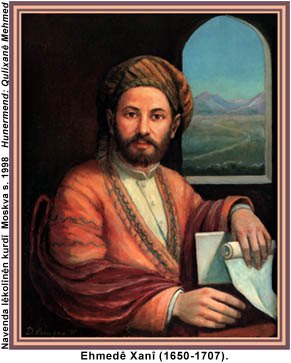
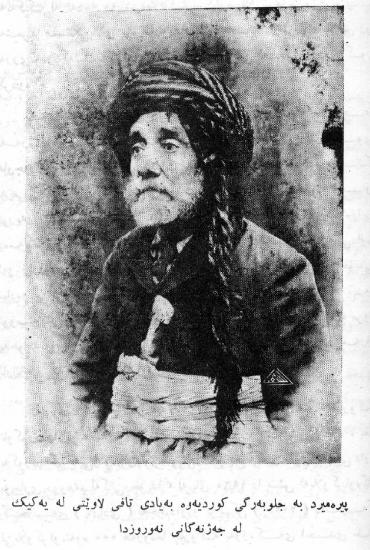

yakem
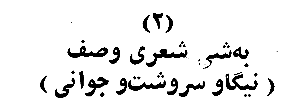
Dwam

Seyam

Chwaram

Penjam

Shasham

Hawtam

Hashtam

Noham

Daham
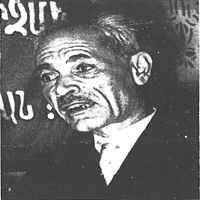
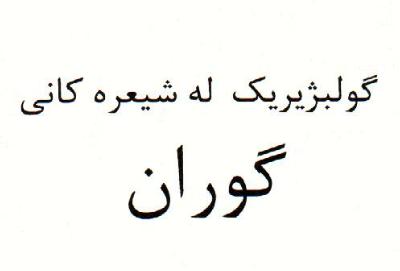
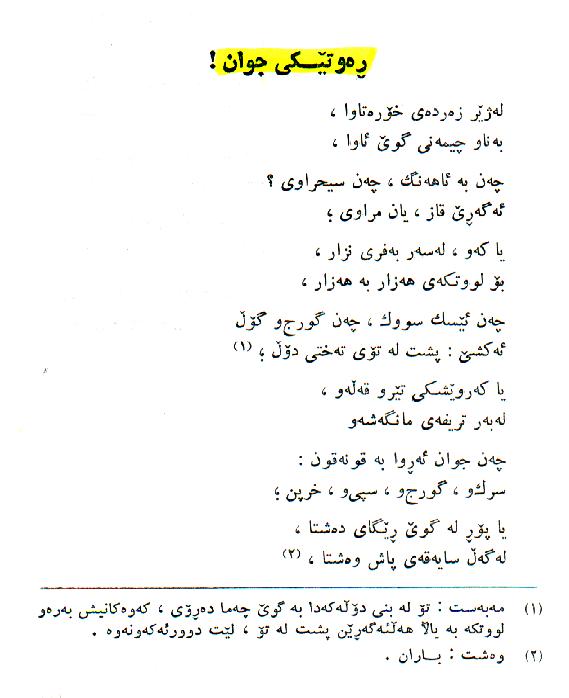
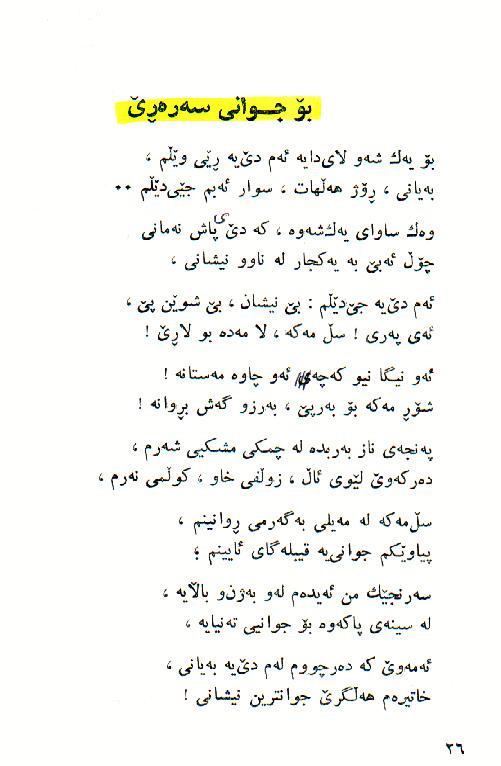
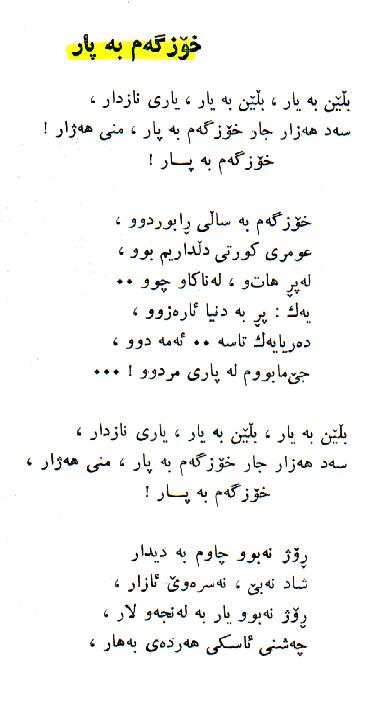
Goran Poems- 1(in Kurdish letters)
Goran Poems- 2(in kurdish letters)

(Latif Halmat)
Latif Halmat was born 1947 in Kifri in Southern Kurdistan. Latif
is working as a journalist and a writer. He has published several collections of poetry. Some of the collections are: God
and our little city (1970), Facing a rebirth (1973), The girl's hair is my tent in summer and winter (1977), The white storm
(1978), The letters that my mother does not read (1979), and Finished and unfinished poems (1979). Latif Halmat has also written
drama. He belongs to the younger generation of Kurdish poets who made their debut during the 1970s.
(Goran)
Goran, was born 1904 or 1905 in Halabja in south Kurdistan, into a family with royal descent. At the
beginning of 1920's, Goran studied at the "Scientific School" in Kirkuk, but after the murder of his elder brother,
he left his studies to take care of the family. Between 1923-37, he worked in nursery schools in Halabja and Hawraman. During
the second world war he worked for a kurdish radiostation in Jaffa (Palestine), which belonged to the allied side, targeting
the fascist nations. Goran was an active politician and fought for democracy and peace. Under the Iraqi monarchy, many dissident
Kurds and communists were arrested. Goran was arrested in november 1951 and released 1952. Untill 1954, he was editor for
the jounal JIN (Life). He was again arrested in late 1954, recieving one years sentence followed by another year of house
arrest in the city of Badra. Goran was released but arrested again few months later. This time he stayed in prison untill
august 1958, ie a month after Iraq transformed into a republic. On his release, Goran was recieved as a hero by the people
and officials. He was chosen as a member for a delegation to visit Soviet Union, China and North Korea. In early 1959, he
gained the position as editor in chief for the journal Shafaq (dawn, later changing name to Bayan). From autumn 1960, he was
a teacher in Kurdish language and literature at the University of Bagdad. In early 1962, he was diagnosed with cancer and
went to Moscow for treatment but died three months later in nevember 1962, after have had returned home to Kurdistan. Goran
published his poems, articles and translations in majority of the Kurdish journals and newspapers between early 1930's and
until his death. During his lifetime, two collections of his poetry were published, Paradise & Memory and Tears &
Art in 1950. His other works were later published by his children.
(Ahmedi Khani)
Ahmedi Khani, the greatest Kurdish poet ever, lived between 1650-1707, in Cizire, a town that lies in the province of
Mardin. Ahmedi Khani, the author of "Mem and Zin", the great Kurdish love story is concidered to be the epoqee of
Kurdish literture. Ehmede Xani's work is a clear evidence of the reality of the Kurdish literature since the tenth century.
Xani, back in the 1600's saw and wrote the Kurdish situation. In his work Kurdish patriotism and Kurdish reality are incredibly
powerful. When people of the region were in the midst of religious conflicts and identified themselves as Christians or Moslems
instead of their ethnic origins, Xani's thesis for an independent Kurdistan was all too advanced. The remarkable fact is that
Xani lived before the rise of modern nationalism.
Abdullah Peshew was born in Bahkra village in Arbil in 1945. He has been living in exile in Russia, Libya and Sweden
since late 1970s. He recieved his PhD in Literature from Moscow University. Peshew has published three volumes of his poems.
The Unknown Soldier
When a foreign delegation goes to a country
They take a wreath of flowers to the tomb
Of the unknown soldier.
If tomorrow
A delegate come to Kurdistan
And asks me; where is the tomb
Of
the unknown soldier?
I say, Sir,
On the strand of every river
On the bench of every mosque
Before the
door of every church
Every cave
On every rock in the mountains
On any tree in the gardens
In this country
On every metre of the sky
Do not worry; bend a little lower
And lay down your garland.
Vigilance
Two thirds of night have passed
Sleep my baby
Put your head on my palm
Lie in my arms
Tonight I will
be wakeful
I won't sleep
You are an Easy sleeper
Nature is stern-faced and its breath is hard
I
am afraid that the sound of the wind
the glimmer of the trees
the roar of the clouds
and the pouring of the
rain
will, God forbid, awaken you
or untie the little Links of your dream chain
Sleep my baby
Put
your head on my palm
Lie in my arms
Don't wait for me to sleep
I Will be vigilant over you.
I will not
sleep.
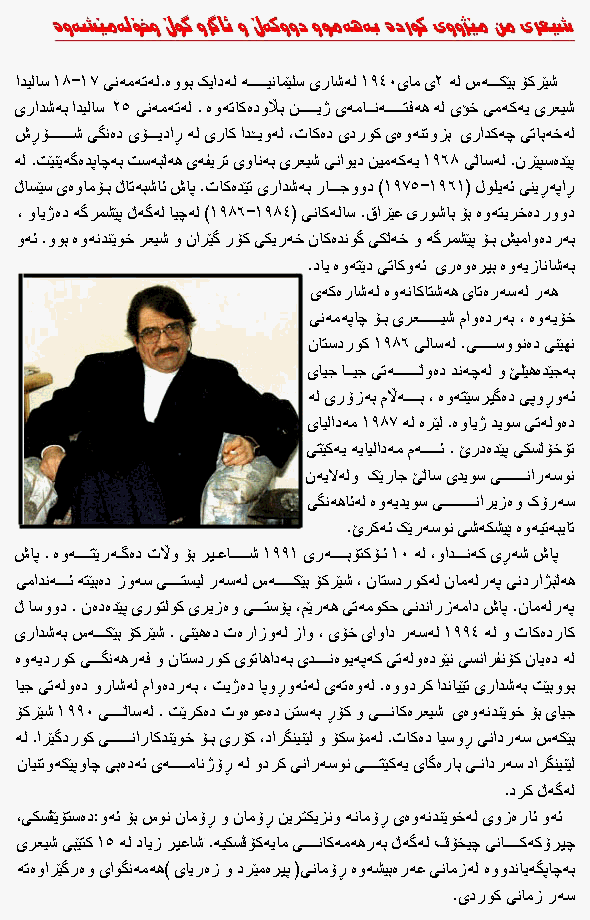
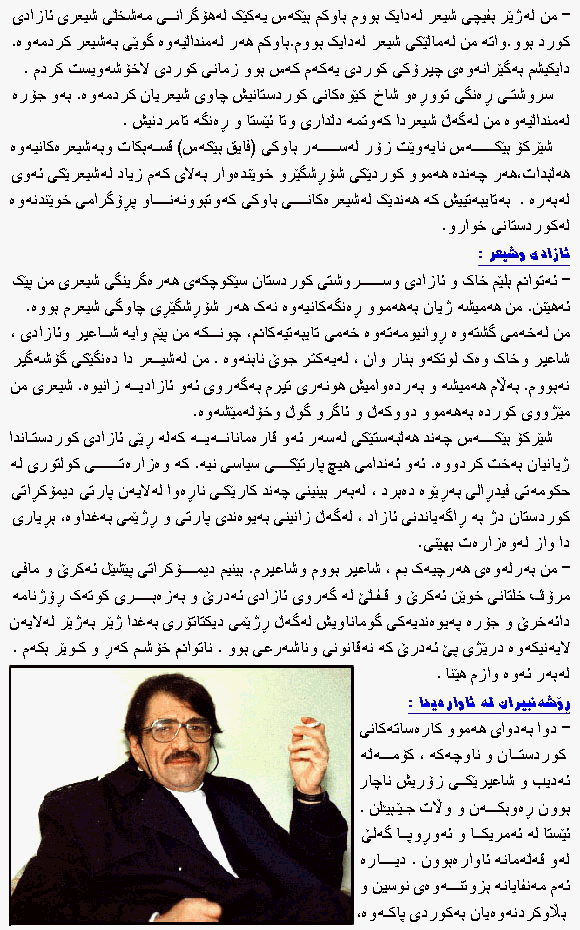
|
 |
|




